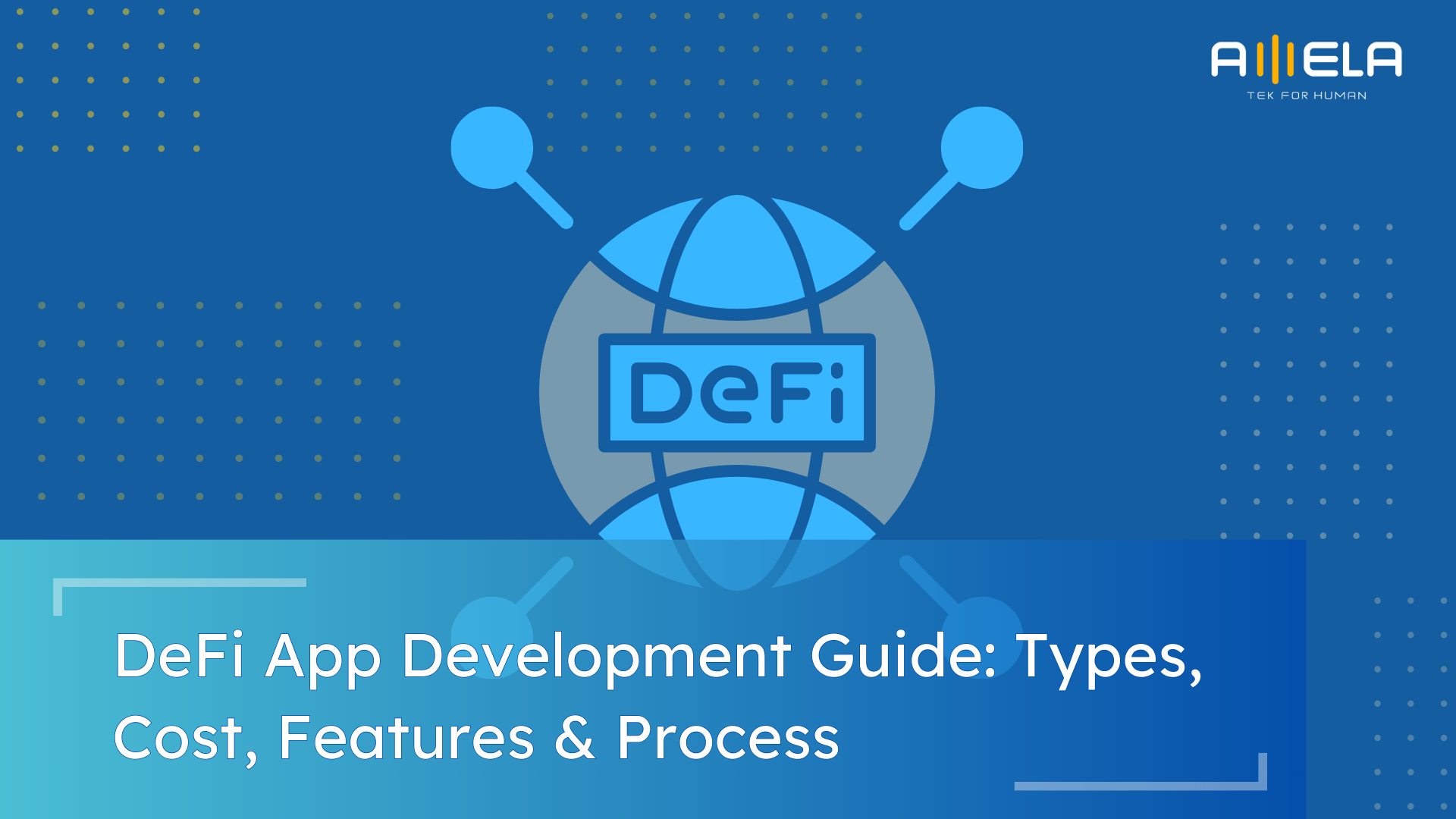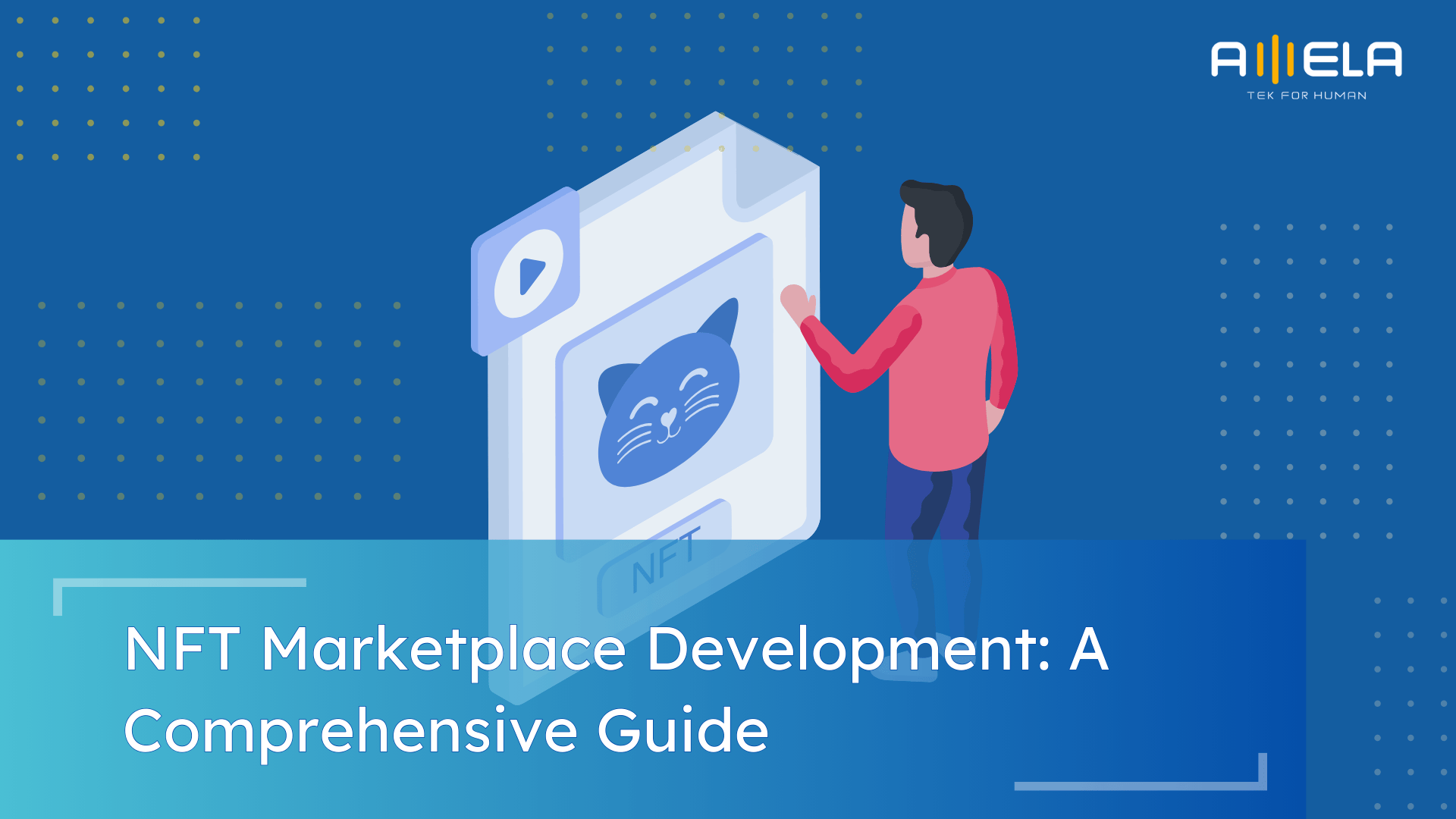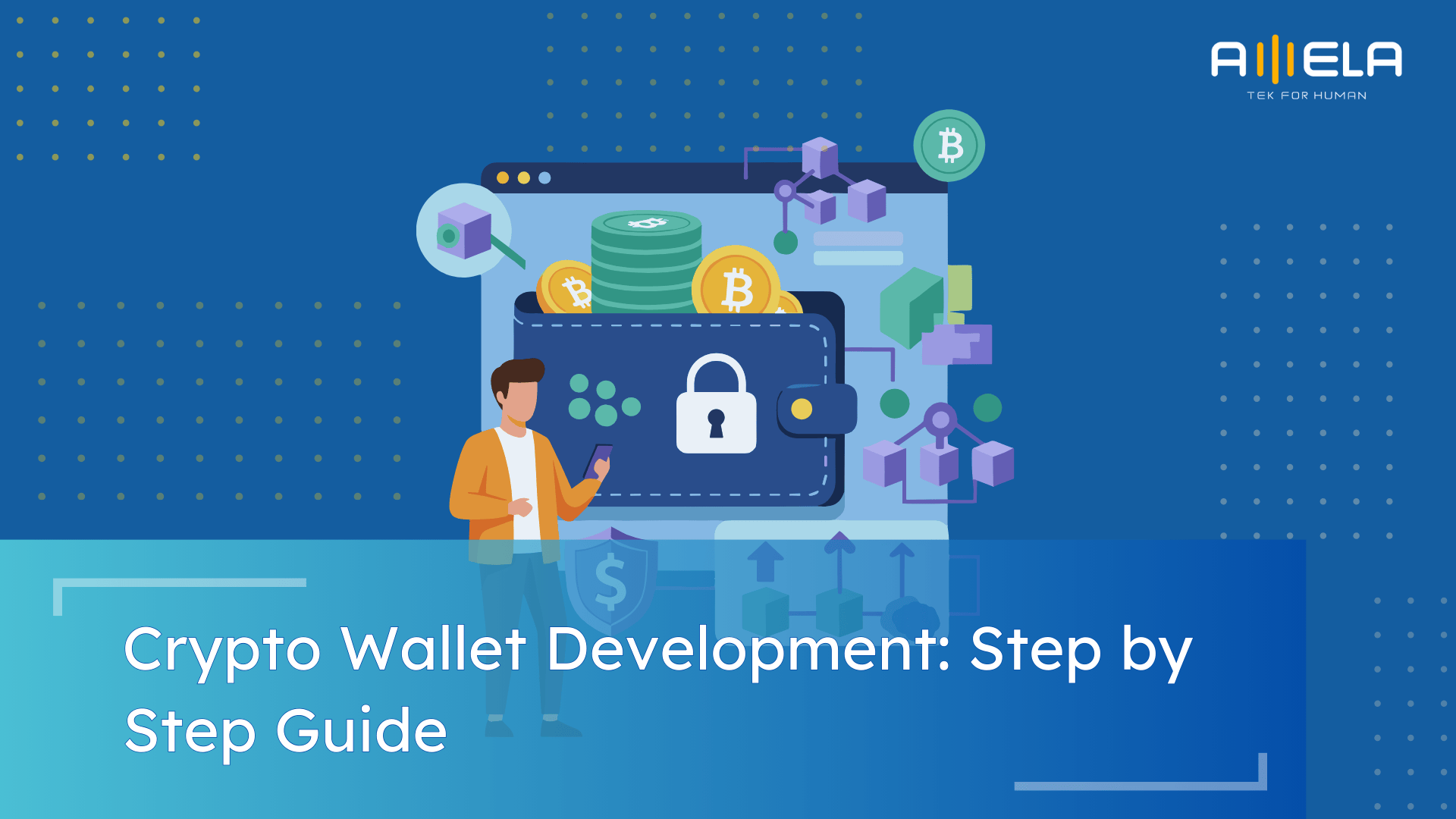Table of Contents
Blockchain can seem complex, but at its core, it’s just data, cryptography, and consensus stitched together. The best way to learn it? Build one. In this guide, we’ll walk through creating a simple blockchain in C# with .NET—covering blocks, hashing, and basic validation. From AMELA team’s experience building blockchain solutions, starting small like this gives developers the clarity to see how real systems work and when to use them.
What is Blockchain?
Blockchain is a tamper-proof ledger, where each record (block) is linked to the one before it using cryptographic hashes. Once data goes in, you can’t quietly change it—the math won’t let you.
From my experience, the beauty of blockchain isn’t just in storing data, it’s in the trust model. Instead of a central authority, the network itself validates what’s true through consensus (like Proof of Work or Proof of Stake). That’s why you’ll hear words like immutable and decentralized—they’re not buzzwords, they’re the core mechanics.
It’s not just about Bitcoin. I’ve seen it applied in finance for transaction security, in logistics for supply chain tracking, and even in gaming for digital ownership. The pattern is the same: if you need transparency + integrity across multiple parties, blockchain delivers.
>>> Related: A Detailed Guide to Building a Blockchain from Scratch
Why Use .NET and C# for Blockchain Development?
At AMELA Technology, we’ve worked with different stacks for blockchain—Python for quick proofs of concept, JavaScript for lightweight apps, even Go for performance-heavy workloads. But when it comes to enterprise-grade blockchain projects, C# and .NET consistently stand out.
Why? Because .NET gives you the structure, security, and performance that real-world systems demand. We’ve seen teams waste weeks patching together Python scripts for cryptography when .NET already has robust libraries like System.Security.Cryptography built in. C#’s strong typing and mature tooling also mean fewer nasty surprises in production.
And it’s not just us saying this. Frameworks like Stratis and NEO—serious blockchain platforms—were built with C#. That’s proof the ecosystem isn’t just for experiments, but for production-ready networks.
From our experience, if you’re a .NET shop already, building a blockchain in C# feels natural. You don’t just learn how the technology works—you build skills that align directly with how real C# Blockchain projects are shipped in the industry.
Core Components of a Blockchain
When we at AMELA explain blockchain to clients or junior devs, we break it down into a few building blocks—literally. You don’t need to start with smart contracts or tokenomics; just get these fundamentals right, and the rest makes sense.
- Block – Think of it as a container for data (transactions, timestamps, previous hash). We’ve seen new devs overcomplicate it, but in practice, a block is just a structured record with a digital fingerprint.
- Chain – The magic happens when blocks link together. Each block carries the hash of the previous one, which is why tampering breaks the chain instantly. It’s a simple idea, but it’s what gives blockchain its trust factor.
- Transactions – These represent the actual data changes (like money transfers, supply chain updates). In our projects, we stress validation here—garbage in, garbage forever.
- Consensus – This is how nodes agree on what’s valid. Proof of Work is easy to demo, but in production we often look at alternatives like Proof of Stake or PBFT because of energy and speed trade-offs.
- Network (optional at first) – A single-node blockchain is fine for learning, but real value comes when multiple nodes keep copies, validate, and sync. That’s when you get decentralization.
From our side, we always tell clients: don’t rush into complex features until you understand these core pieces. Even a basic blockchain prototype in C# with blocks, a chain, and simple validation is enough to unlock the “aha” moment. Everything else—tokens, contracts, wallets—gets built on top of this foundation.
Build a Simple Blockchain in C# (.NET): Step-by-Step
TL;DR: You’ll code a minimal blockchain (blocks → chain → PoW → transactions) in C# with clean, testable classes and guardrails we use at AMELA. Here’s the full C# Blockchain Development process:
0) Setup (2 minutes)
- SDK: .NET 8+
- Create project:
dotnet new console -n MiniChain cd MiniChain - Folders: Domain/, Services/, Demo/ (keeps things tidy for growth).
1) Block model (hash + previous hash)
From experience: keep the block boring. Deterministic JSON + SHA-256; no hidden fields, no time-zone shenanigans.
// Domain/Block.cs
using System.Security.Cryptography;
using System.Text;
using System.Text.Json;
public sealed class Block
{
public int Index { get; }
public DateTimeOffset Timestamp { get; }
public string PreviousHash { get; }
public IReadOnlyList<Transaction> Transactions { get; }
public long Nonce { get; private set; }
public string Hash { get; private set; }
public Block(int index, DateTimeOffset ts, string prevHash, IEnumerable<Transaction> txs)
{
Index = index;
Timestamp = ts;
PreviousHash = prevHash;
Transactions = txs.ToList().AsReadOnly();
Nonce = 0;
Hash = ComputeHash();
}
/// <summary>
/// Computes the SHA-256 hash of the block’s contents.
/// </summary>
public string ComputeHash()
{
var payload = new
{
Index,
Timestamp = Timestamp.ToUnixTimeSeconds(),
PreviousHash,
Nonce,
Tx = Transactions.Select(t => new { t.From, t.To, t.Amount, t.Signature })
};
var json = JsonSerializer.Serialize(payload);
using var sha = SHA256.Create();
var bytes = sha.ComputeHash(Encoding.UTF8.GetBytes(json));
return Convert.ToHexString(bytes); // uppercase hex string
}
/// <summary>
/// Sets the proof-of-work result.
/// </summary>
public void SetProof(long nonce, string hash)
{
Nonce = nonce;
Hash = hash;
}
}// Domain/Transaction.cs
public sealed class Transaction
{
public string From { get; }
public string To { get; }
public decimal Amount { get; }
public string? Signature { get; } // Keep simple for now
public Transaction(string from, string to, decimal amount, string? signature = null)
{
From = from;
To = to;
Amount = amount;
Signature = signature;
}
}AMELA tip: serialize with explicit fields only; never hash a .ToString()—it will drift.
2) Proof of Work (keep it simple, make it testable)
We isolate PoW so we can swap it later (e.g., PoS/PBFT).
// Services/ProofOfWork.cs
public sealed class ProofOfWork
{
private readonly int _difficulty; // number of leading zeros in hex
public ProofOfWork(int difficulty) => _difficulty = difficulty;
public (long nonce, string hash) Mine(Block block)
{
var target = new string('0', _difficulty);
long nonce = 0;
while (true)
{
// mutate nonce temporarily
var temp = new Block(block.Index, block.Timestamp, block.PreviousHash, block.Transactions);
typeof(Block).GetProperty(nameof(Block.Nonce))!
.SetValue(temp, nonce);
var hash = temp.ComputeHash();
if (hash.StartsWith(target, StringComparison.Ordinal))
return (nonce, hash);
nonce++;
}
}
public bool Validate(Block block)
{
var target = new string('0', _difficulty);
return block.Hash.StartsWith(target, StringComparison.Ordinal)
&& block.ComputeHash() == block.Hash;
}
}Why hex prefix? It’s reproducible and easy to eyeball in logs. Also, start with difficulty = 4 (dev laptops won’t melt).
3) Blockchain in C#: add, mine, validate
Make validation boring and strict: previous hash link, PoW valid, and indexes monotonic.
// Services/Blockchain.cs
public sealed class Blockchain
{
private readonly ProofOfWork _pow;
private readonly List<Block> _chain = new();
private readonly List<Transaction> _mempool = new();
public IReadOnlyList<Block> Chain => _chain.AsReadOnly();
public Blockchain(ProofOfWork pow)
{
_pow = pow;
_chain.Add(CreateGenesis());
}
private Block CreateGenesis()
{
var genesis = new Block(0, DateTimeOffset.UtcNow, "GENESIS", Array.Empty<Transaction>());
var (nonce, hash) = _pow.Mine(genesis);
genesis.SetProof(nonce, hash);
return genesis;
}
public void AddTransaction(Transaction tx)
{
// Minimal checks; in real life verify signatures, balances, replay, etc.
if (tx.Amount <= 0) throw new ArgumentException("Amount must be positive.");
_mempool.Add(tx);
}
public Block MinePending(string minerAddress)
{
// coinbase transaction (reward) — static for demo
var reward = new Transaction("NETWORK", minerAddress, 1m);
var bundle = _mempool.Prepend(reward).ToList();
var prev = _chain[^1];
var candidate = new Block(prev.Index + 1, DateTimeOffset.UtcNow, prev.Hash, bundle);
var (nonce, hash) = _pow.Mine(candidate);
candidate.SetProof(nonce, hash);
if (!IsValidNext(candidate, prev))
throw new InvalidOperationException("Invalid block.");
_chain.Add(candidate);
_mempool.Clear();
return candidate;
}
public bool IsValidChain()
{
for (int i = 1; i < _chain.Count; i++)
{
if (!IsValidNext(_chain[i], _chain[i - 1])) return false;
}
return true;
}
private bool IsValidNext(Block current, Block previous)
{
if (current.Index != previous.Index + 1) return false;
if (current.PreviousHash != previous.Hash) return false;
if (!_pow.Validate(current)) return false;
return true;
}
}AMELA tip: validate both linkage and recomputed hash; never trust stored hashes blindly.
4) Wire it up (demo)
Log the hashes and difficulty: helps you feel the chain under your fingers.
// Program.cs (or Demo/Run.cs)
using System;
class Program
{
static void Main()
{
var pow = new ProofOfWork(difficulty: 4);
var chain = new Blockchain(pow);
chain.AddTransaction(new Transaction("alice", "bob", 10m));
chain.AddTransaction(new Transaction("bob", "carol", 2.5m));
Console.WriteLine("⛏️ Mining block 1...");
var b1 = chain.MinePending("miner-01");
Console.WriteLine($"Block #{b1.Index} Hash: {b1.Hash[..12]}... Prev: {b1.PreviousHash[..12]}...");
chain.AddTransaction(new Transaction("carol", "dave", 1.2m));
Console.WriteLine("⛏️ Mining block 2...");
var b2 = chain.MinePending("miner-01");
Console.WriteLine($"Block #{b2.Index} Hash: {b2.Hash[..12]}... Valid: {chain.IsValidChain()}");
Console.WriteLine($"Chain length: {chain.Chain.Count}");
foreach (var b in chain.Chain)
Console.WriteLine($"#{b.Index} [{b.Timestamp}] {b.Hash[..12]}... <= {b.PreviousHash[..8]}...");
}
}
5) Quick tests we actually run
Here are a few checks we make when building a blockchain in C#:
- Tamper check: modify a transaction, ensure IsValidChain() flips to false.
- Replay guard (next step): add a simple TxId and reject duplicates.
- Determinism: same block properties → same hash (watch timestamp granularity).
AMELA pitfall watchlist:
- Hashing with non-deterministic serialization (order of properties, floating-point formats).
- Mixing local times; always use UTC.
- Difficulty too high in dev; too low in demo (doesn’t “feel” like mining).
6) Where to go next with the blockchain C# project
- Digital signatures: ECDSA on transactions; verify that the owner owns the key.
- Balances & mempool rules: prevent overspend; rate-limit spam.
- Networking: simple P2P (gossip blocks/tx, resolve longest valid chain).
- Persistence: append-only store (SQLite/LiteDB) for recovery.
- Replace PoW: PoS, VRF, or PBFT-style consensus for energy and latency.
- APIs & UI: expose /mine, /tx, /blocks, and add a tiny dashboard.
Next Steps: Enhancing Your C# Blockchain
The simple C# blockchain we built works—but only as a demo. In real-world projects, you’ll need extra features to make it secure and usable. Here are the key upgrades we recommend from our experience at AMELA:
1) Add Digital Signatures
Right now, anyone can submit a transaction. In practice, every transaction should be signed with a private key and verified with the sender’s public key.
- In C#, you can use System.Security.Cryptography.ECDsa for generating keys and verifying signatures.
- This ensures only the owner of an account can spend funds.
2) Secure Transactions and Balances
Add rules to your mempool so it only accepts valid transactions:
- Check the signature is correct.
- Check the sender has enough balance.
- Prevent duplicate or replayed transactions.
This is where you’ll decide whether to use a UTXO model (like Bitcoin) or an account model (like Ethereum). For learning, the account model is easier to implement in C#.
3) Introduce Persistence
In the current version, your blockchain lives in memory. Once you close the program, it’s gone. For real use:
- Use SQLite or LiteDB in .NET to store blocks permanently.
- Add simple indexes so you can quickly retrieve blocks or transactions.
4) Build an API Layer
Right now, you interact via console logs. To make your blockchain usable:
- Expose REST endpoints with ASP.NET Core.
- POST /tx → Submit a transaction.
- GET /blocks → Fetch the chain.
- POST /mine → Trigger mining (for demo purposes).
- Later, you can add a small frontend or dashboard.
5) Plan for Networking
For a true blockchain, multiple nodes need to talk. Start small:
- Use SignalR or WebSockets in .NET to broadcast new blocks and transactions.
- Add simple logic to sync chains across nodes.
>>> Related: C++ Blockchain Development: A Detailed Guide
Conclusion
Building a blockchain in C# with .NET isn’t about reinventing Bitcoin—it’s about understanding the mechanics: blocks, hashes, consensus, and validation. Once you’ve got a simple chain running, every new feature—signatures, APIs, persistence—brings you closer to how production systems really work.
From our experience at AMELA, this exercise pays off twice: you learn blockchain fundamentals in a hands-on way, and you sharpen your C#/.NET skills for real-world distributed applications.
Thinking about turning your prototype into something bigger? Whether it’s exploring smart contracts, scaling nodes, or securing enterprise transactions, blockchain development services at AMELA has helped clients take those next steps. Let’s talk about how we can do the same for you.

 Sep 27, 2025
Sep 27, 2025 

